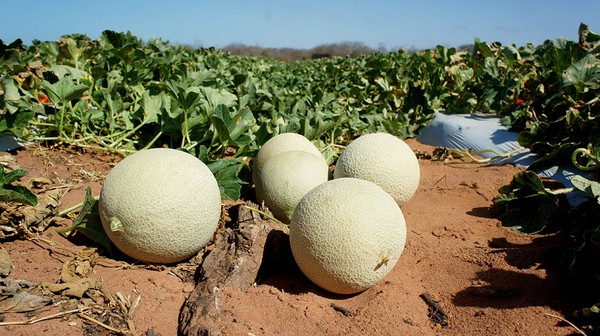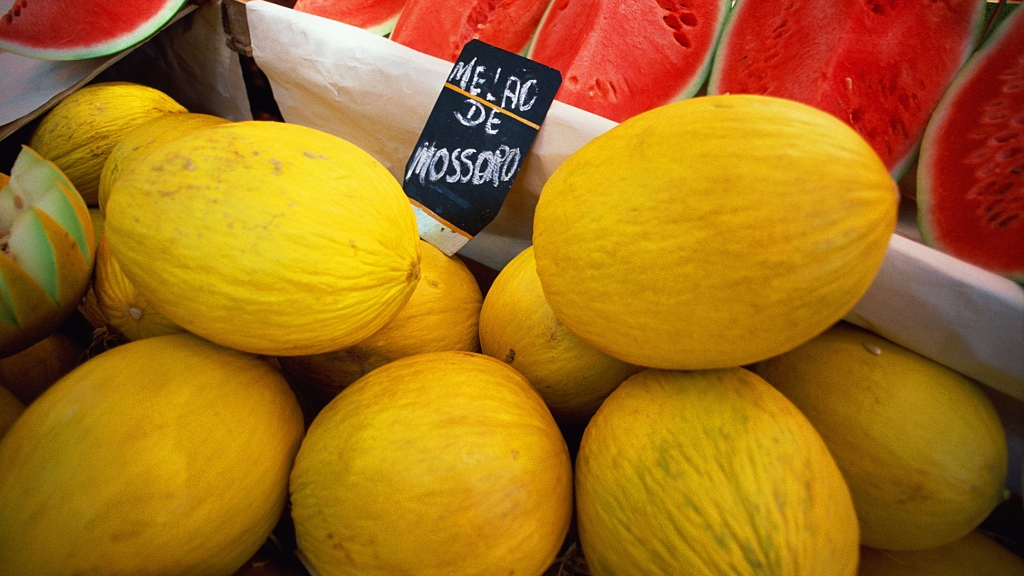In the year trade between China and Brazil is expected to jump from last year's 98.7 billion U.S. dollars to 105 or 110 billion U.S. dollars, according to Marcos Troyjo, foreign trade secretary at the Brazilian Economy Ministry, cited by Reuters, a new trade window is about to be opened.
During BRICS Summit in Brasilia, a few weeks back, Brazil and China closed a melon trade deal. This might seem unimportant, but it's symbolic since it's the first-ever agreement between both sides involving fruit. China will export pears and import melons. On the Brazilian side, melon farm producers are excited about the new market prospects.
"Brazilian producers' expectations are the very best," said Jorge de Souza, project manager for the Brazilian Association of Producers and Exporters of Fruits and Derivatives (Abrafrutas), to CGTN Digital.

Brazilian melon farm /Photo Abrafrutas
Brazilian melon farm /Photo Abrafrutas
"The benefits will be mutual, because both parts will eat better, with more diversity and quality, contributing to both societies' well-being," said Jorge de Souza, noting that regional development is also positive with 10,000 jobs expected to be created.
According to Abrafrutas representative, there is a group of around 20 big producers in the northeastern region that will probably be the export pioneers. The Brazilian state of Rio Grande do Norte is the greatest exporter of melon, selling to other countries 95,9 percent of all its melon production.
Even though there are still a few small operational details that need confirmation from the GACC (General Administration of Customs of the People's Republic of China), the association is confident that shipping will start at the beginning of December.
Jorge de Souza explained that Chinese importers are interested in buying melon during China's wintertime when local production is almost impossible. "We will start with a few samples of our products, a few containers so that we can understand local preferences for flavor and texture. Once we define those parameters, importers will outline the possible volumes. Our production capacity is suitable for planned growth, and it's within China's consumption expectation, which is bigger than Brazil's."
"We will have to find a point of balance between the price expectation and business profitability, not only for Brazilian producers but also for the Chinese importers and consumers' expectations. Everyone must win to guarantee business sustainability," Jorge de Souza added.
For the producers' association, "China is and will be a very important partner for Brazil in terms of food," because it is a great exporter and importer of food products.
Learn from this experience to expand fruit trade deals

Melon stand, Brazil /VCG Photo
Melon stand, Brazil /VCG Photo
In a phone interview with CGTN Digital, Felipe Hees, Minister Counselor at the Embassy of Brazil in Beijing, said that because this is the first fruit protocol between Brazil and China, there are "several questions that are new."
"We have meat protocols, but it's not the same. We will look at the melon exports to understand and learn lessons that can be applied to other fruits. Production and shipping costs, consumer targets are some of the questions that need to be answered in the next few months," stated Hees.
At present, both countries already have corn, tobacco, and meat protocols in place.
Brazilian peanuts, sesame, and grapes under risk analysis
Hees revealed that other food products are being assessed by China's authorities.
"We have several products being negotiated with the Chinese counterpart. Some are already under risk analysis, a necessary step before signing the phytosanitary protocol. When Brazilian Agriculture Minister, Teresa Cristina, visited Beijing in October, she said Brazil was interested in exporting grapes, and now China is doing the risk analysis," said the Minister Counselor.
Also, next month, the South American country expects to sign a deal on genetic material from poultry, after the conclusion of the last stage of negotiation.
During President Xi Jinping's visit to Brasilia for the BRICS Summit, both sides signed action plans in agriculture, creating cooperation channels for further development, for example in terms of Big Data analysis, and technology application in agriculture.
'No doubts' China-Brazil relations are pragmatic and objective
Taking into account that last year's electoral campaign in Brazil was very polarized and issues like the U.S. and 5G networks were under public scrutiny, Hees emphasized that the visit of vice-president Mourão and president Bolsonaro to China, and then President Xi Jinping's participation in the BRICS Summit in the Brazilian capital left "no doubts that the partnership between the two countries is pragmatic, with objective and concrete aims."
The action plans signed during the BRICS meeting might lack practical objectives, but they have a very strong political meaning. "They confirm the quality and the importance of the bilateral relationship," noted Hees.